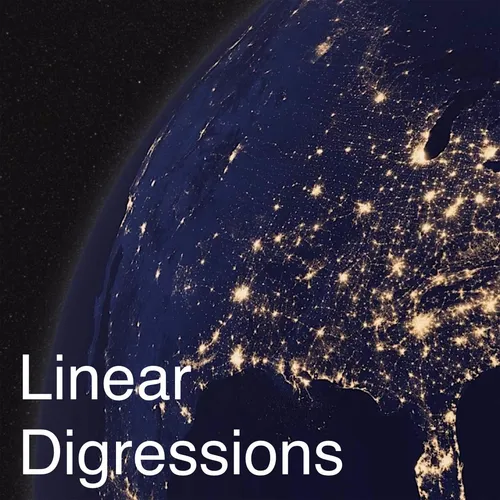
Linear Digressions
In each episode, your hosts explore machine learning and data science through interesting (and often very unusual) applications.
- Update frequency
- every 6 days
- Average duration
- 19 minutes
- Episodes
- 291
- Years Active
- 2014 - 2020

Interview with Joel Grus
This week’s episode is a special one, as we’re welcoming a guest: Joel Grus is a data scientist with a strong software engineering streak, and he does an impressive amount of speaking, writing, and p…
00:39:46 |
Mon 10 Jun 2019

Re - Release: Factorization Machines
What do you get when you cross a support vector machine with matrix factorization? You get a factorization machine, and a darn fine algorithm for recommendation engines.
00:20:09 |
Mon 03 Jun 2019

Re-release: Auto-generating websites with deep learning
We've already talked about neural nets in some detail (links below), and in particular we've been blown away by the way that image recognition from convolutional neural nets can be fed into recurrent…
00:19:38 |
Mon 27 May 2019

Advice to those trying to get a first job in data science
We often hear from folks wondering what advice we can give them as they search for their first job in data science. What does a hiring manager look for? Should someone focus on taking classes online,…
00:17:33 |
Sun 19 May 2019

Re - Release: Machine Learning Technical Debt
This week, we've got a fun paper by our friends at Google about the hidden costs of maintaining machine learning workflows. If you've worked in software before, you're probably familiar with the ide…
00:22:29 |
Sun 12 May 2019

Estimating Software Projects, and Why It's Hard
If you’re like most software engineers and, especially, data scientists, you find it really hard to make accurate estimates of how long a project will take to complete. Don’t feel bad: statistics is …
00:19:07 |
Sun 05 May 2019

The Black Hole Algorithm
53.5 million light-years away, there’s a gigantic galaxy called M87 with something interesting going on inside it. Between Einstein’s theory of relativity and the motion of a group of stars in the ga…
00:20:17 |
Mon 29 Apr 2019

Structure in AI
As artificial intelligence algorithms get applied to more and more domains, a question that often arises is whether to somehow build structure into the algorithm itself to mimic the structure of the …
00:19:05 |
Sun 21 Apr 2019

The Great Data Science Specialist vs. Generalist Debate
It’s not news that data scientists are expected to be capable in many different areas (writing software, designing experiments, analyzing data, talking to non-technical stakeholders). One thing that …
00:14:10 |
Mon 15 Apr 2019

Google X, and Taking Risks the Smart Way
If you work in data science, you’re well aware of the sheer volume of high-risk, high-reward projects that are hypothetically possible. The fact that they’re high-reward means they’re exciting to thi…
00:19:04 |
Mon 08 Apr 2019

Statistical Significance in Hypothesis Testing
When you are running an AB test, one of the most important questions is how much data to collect. Collect too little, and you can end up drawing the wrong conclusion from your experiment. But in a wo…
00:22:34 |
Mon 01 Apr 2019

The Language Model Too Dangerous to Release
OpenAI recently created a cutting-edge new natural language processing model, but unlike all their other projects so far, they have not released it to the public. Why? It seems to be a little too goo…
00:21:01 |
Mon 25 Mar 2019

The cathedral and the bazaar
Imagine you have two choices of how to build something: top-down and controlled, with a few people playing a master designer role, or bottom-up and free-for-all, with nobody playing an explicit archi…
00:32:36 |
Sun 17 Mar 2019

AlphaStar
It’s time for our latest installation in the series on artificial intelligence agents beating humans at games that we thought were safe from the robots. In this case, the game is StarCraft, and the A…
00:22:03 |
Mon 11 Mar 2019

Are machine learning engineers the new data scientists?
For many data scientists, maintaining models and workflows in production is both a huge part of their job and not something they necessarily trained for if their background is more in statistics or m…
00:20:46 |
Mon 04 Mar 2019

Interview with Alex Radovic, particle physicist turned machine learning researcher
You’d be hard-pressed to find a field with bigger, richer, and more scientifically valuable data than particle physics. Years before “data scientist” was even a term, particle physicists were inventi…
00:35:42 |
Mon 25 Feb 2019

K Nearest Neighbors
K Nearest Neighbors is an algorithm with secrets. On one hand, the algorithm itself is as straightforward as possible: find the labeled points nearest the point that you need to predict, and make a p…
00:16:25 |
Sun 17 Feb 2019

Not every deep learning paper is great. Is that a problem?
Deep learning is a field that’s growing quickly. That’s good! There are lots of new deep learning papers put out every day. That’s good too… right? What if not every paper out there is particularly g…
00:17:54 |
Mon 11 Feb 2019

The Assumptions of Ordinary Least Squares
Ordinary least squares (OLS) is often used synonymously with linear regression. If you’re a data scientist, machine learner, or statistician, you bump into it daily. If you haven’t had the opportunit…
00:25:07 |
Sun 03 Feb 2019

Quantile Regression
Linear regression is a great tool if you want to make predictions about the mean value that an outcome will have given certain values for the inputs. But what if you want to predict the median? Or th…
00:21:46 |
Mon 28 Jan 2019
Disclaimer: The podcast and artwork embedded on this page are the property of Ben Jaffe and Katie Malone ([email protected]). This content is not affiliated with or endorsed by eachpod.com.